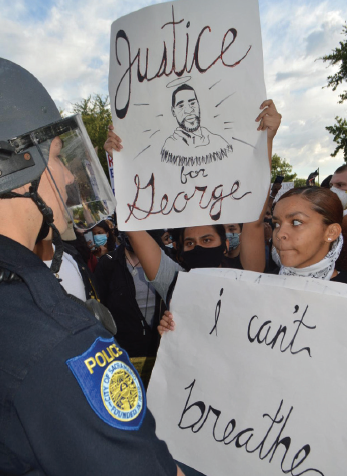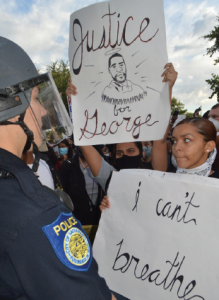Activism
Mourning and Mayhem: California Reacts to the Brutal Killing of George Floyd


Protestors take to the State Capitol and were met by heavy police presence May 30, 2020. Photo by Antonio Harvey.
Protesters and pastors across California as well as angered citizens and politicians — including Gov. Gavin Newsom — have all responded to the violent death of an unarmed Black man in Minnesota.
George Floyd, 46, died in police custody after a white officer, Derek Chauvin, kneeled on his neck for nearly eight minutes during an arrest in Minneapolis on May 25. The cellphone video of the brutal killing has been shared tens of millions of times around the world. In it, Floyd can be heard pleading for help and letting the officers know that he was suffocating.
“I can’t breathe,” Floyd cries out to the cops. He also called out for his mama.
Floyd was killed almost a year to the date that the California state Assembly passed AB 392 in May 2019. The bill Weber introduced and championed raised the bar for police officers to justify using lethal force in California. It took effect on Jan. 1, 2020.
In the days following Floyd’s death, fiery protests have escalated into violent rioting in every major American city, and some smaller towns, too. There have also been demonstrations in Ireland, England, Germany, Israel and South Africa.
Here in California, the demonstrations have led to the death of a Black law enforcement professional, mass looting, arson, vandalism and billions of dollars in property loss. The protests got so violent and destructive in Los Angeles that Gov. Newsom has declared a state of emergency in all of Los Angeles County after the city requested emergency aid for the state to activate and deploy the California National Guard.
In Oakland on Saturday, a gunman opened fire in front of the Ronald V. Dellums Federal building, killing a 53-year-old African American Federal Protective Services Officer who lived in Pinole on the north East Bay. Another officer, who is currently hospitalized, was also shot.
“We are further saddened and outraged by this callous act of gun violence. This crime is under investigation,” wrote U.S. Representative Barbara Lee (D-CA-13). “But we should never conflate the actions of murderers with the motives of protesters demanding justice.”
Assembly member Sydney Kamlager (D-Los Angeles), who attended a march in Los Angeles, tweeted, “There are no amount of hashtags or social media posts to remember the effects of the internalized trauma from experiencing repeated police brutality in America. I stand firm in the fight to decriminalize Blackness.”
The California Legislative Black Caucus (CLBC) issued a statement after Floyd’s death.
“There were other officers who could have helped him but did not,” read the CLBC statement. “They instead preferred to stand by and watch as their colleague killed an unarmed man. There were bystanders who wanted to help him but could not because of the uniforms, guns and badges that stood in the way”
Assembly member Shirley Weber (D-San Diego), the chair of the CLBC, also took to Twitter to express her grief, horror and support for the victim’s family.
“George Floyd should be alive today,” Weber tweeted. The members of CLBC, she told her followers, “stand with his family, the people of Minneapolis, and those speaking out in the name of justice.”
On Thursday, Newsom said he understood the raw emotion that sparked the protests.
“Over the last few days, we have seen millions of people lift their voices in anger, rightfully outraged at how systemic racism is allowed to persist,” Newsom said. “Every single day, people of color are disadvantaged and discriminated against. Black and Latino men in particular face mortal danger all across this country simply because of their race. Every person who has raised their voice should be heard.”
The governor also condemned the violence that has sidelined the protests.
“In California and across the country, there are indications that violent actors may be attempting to use these protests for their own agendas,” the governor said. “We are closely monitoring organizing by violent extremist organizations. To those who seek to exploit Californians’ pain to sow chaos and destruction, you are not welcome.”
Last week, the Rev. Shane Harris, president of the People’s Alliance of Justice, attended a rally supporting Floyd’s family in Minneapolis. Harris, who is an activist based in San Diego, joined the Rev. Al Sharpton and other activists and faith leaders from across the country.
“A Black man went to death row before he could ever get to court over an alleged nonviolent offense,” Harris said. “The County DA’s response to whether he’s filing charges shows us he must have selective justice in his mind.”
Sen. Shannon Grove (R-Bakersfield), minority leader in the California Senate, says she empathizes with the outrage but called the riots “unacceptable”.
“Today our state and country woke up with a mixture of emotions,” said Grove. “We feel sadness and grief for George Floyd’s family, and we feel anger and frustration with those who would use a tragic event to vandalize, loot, and destroy communities.”
In a solemn ceremony on Sunday afternoon, San Francisco Mayor London Breed took a knee with local leaders in the Mission District in the city. She called for justice and asked the protest organizers to remain true to the spirit of non-violence that underpins their activism.
“Your words mean nothing if your actions are something else,” Breed advised. “Stop turning Black Lives Matter into a joke, because it’s not. It’s born out of pain, it’s born out of disrespect and racism.”
Activism
Oakland Post: Week of April 24 – 30, 2024
The printed Weekly Edition of the Oakland Post: Week of April 24 – 30, 2024

To enlarge your view of this issue, use the slider, magnifying glass icon or full page icon in the lower right corner of the browser window. ![]()
Activism
Oakland Post: Week of April 17 – 23, 2024
The printed Weekly Edition of the Oakland Post: Week of April 17 – 23, 2024

To enlarge your view of this issue, use the slider, magnifying glass icon or full page icon in the lower right corner of the browser window. ![]()
Activism
Oakland Schools Honor Fred Korematsu Day of Civil Liberties
Every Jan. 30, OUSD commemorates the legacy of Fred Korematsu, an Oakland native, a Castlemont High School graduate, and a national symbol of resistance, resilience, and justice. His defiant stand against racial injustice and his unwavering commitment to civil rights continue to inspire the local community and the nation. Tuesday was “Fred Korematsu Day of Civil Liberties and the Constitution” in the state of California and a growing number of states across the country.

By Post Staff
Every Jan. 30, OUSD commemorates the legacy of Fred Korematsu, an Oakland native, a Castlemont High School graduate, and a national symbol of resistance, resilience, and justice.
His defiant stand against racial injustice and his unwavering commitment to civil rights continue to inspire the local community and the nation. Tuesday was “Fred Korematsu Day of Civil Liberties and the Constitution” in the state of California and a growing number of states across the country.
One OUSD school is named in his honor: Fred T. Korematsu Discovery Academy (KDA) elementary in East Oakland.
Several years ago, founding KDA Principal Charles Wilson, in a video interview with anti-hate organization “Not In Our Town,” said, “We chose the name Fred Korematsu because we really felt like the attributes that he showed in his work are things that the children need to learn … that common people can stand up and make differences in a large number of people’s lives.”
Fred Korematsu was born in Oakland on Jan. 30, 1919. His parents ran a floral nursery business, and his upbringing in Oakland shaped his worldview. His belief in the importance of standing up for your rights and the rights of others, regardless of race or background, was the foundation for his activism against racial prejudice and for the rights of Japanese Americans during World War II.
At the start of the war, Korematsu was turned away from enlisting in the National Guard and the Coast Guard because of his race. He trained as a welder, working at the docks in Oakland, but was fired after the bombing of Pearl Harbor in 1941. Fear and prejudice led to federal Executive Order 9066, which forced more than 120,000 Japanese Americans out of their homes and neighborhoods and into remote internment camps.
The 23-year-old Korematsu resisted the order. He underwent cosmetic surgery and assumed a false identity, choosing freedom over unjust imprisonment. His later arrest and conviction sparked a legal battle that would challenge the foundation of civil liberties in America.
Korematsu’s fight culminated in the Supreme Court’s initial ruling against him in 1944. He spent years in a Utah internment camp with his family, followed by time living in Salt Lake City where he was dogged by racism.
In 1976, President Gerald Ford overturned Executive Order 9066. Seven years later, the 9th Circuit Court of Appeals in San Francisco vacated Korematsu’s conviction. He said in court, “I would like to see the government admit that they were wrong and do something about it so this will never happen again to any American citizen of any race, creed, or color.”
Korematsu’s dedication and determination established him as a national icon of civil rights and social justice. He advocated for justice with Rosa Parks. In 1998, President Bill Clinton gave him the Presidential Medal of Freedom saying, “In the long history of our country’s constant search for justice, some names of ordinary citizens stand for millions of souls … To that distinguished list, today we add the name of Fred Korematsu.”
After Sept. 11, 2001, Korematsu spoke out against hatred and discrimination, saying what happened to Japanese Americans should not happen to people of Middle Eastern descent.
Korematsu’s roots in Oakland and his education in OUSD are a source of great pride for the city, according to the school district. His most famous quote, which is on the Korematsu elementary school mural, is as relevant now as ever, “If you have the feeling that something is wrong, don’t be afraid to speak up.”
-

 Activism4 weeks ago
Activism4 weeks agoOakland Post: Week of March 27 – April 2, 2024
-

 #NNPA BlackPress4 weeks ago
#NNPA BlackPress4 weeks agoBeloved Actor and Activist Louis Cameron Gossett Jr. Dies at 87
-

 Community1 week ago
Community1 week agoFinancial Assistance Bill for Descendants of Enslaved Persons to Help Them Purchase, Own, or Maintain a Home
-

 Activism3 weeks ago
Activism3 weeks agoOakland Post: Week of April 3 – 6, 2024
-

 Business1 week ago
Business1 week agoV.P. Kamala Harris: Americans With Criminal Records Will Soon Be Eligible for SBA Loans
-

 Activism2 weeks ago
Activism2 weeks agoOakland Post: Week of April 10 – 16, 2024
-

 Community1 week ago
Community1 week agoAG Bonta Says Oakland School Leaders Should Comply with State Laws to Avoid ‘Disparate Harm’ When Closing or Merging Schools
-

 Community6 days ago
Community6 days agoOakland WNBA Player to be Inducted Into Hall of Fame













































